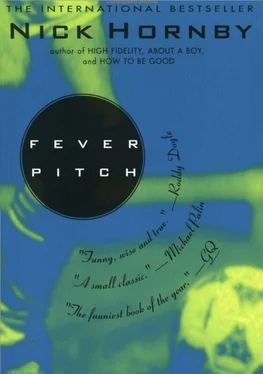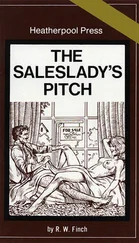The problem here is that unless a team is playing well, winning things, filling their stadia, clubs simply cannot afford to alienate the very people they are supposed to be purging. I can think of at least one club chairman who has in the past been conspicuously ambivalent about some of the unpleasant characters that keep his club afloat, and I have not been aware of any particularly strident campaigning on the part of the England authorities to drive out one crowd and bring in another (any campaigning of that kind has been done by the fans themselves); they know, deep down, which side their bread is buttered on.
I tried to compensate for the evening by offering to take my new workmates to Highbury, where I knew that we would be left undisturbed whether we stood on the terraces or sat in the seats. But every time I suggested it, they just looked at me and smiled, as if the invitation was an extreme example of the famously incomprehensible English sense of humour. I guess they still think I spend every Saturday afternoon being charged by police horses and then cowering in a gangway somewhere, too frightened to claim the seat I have paid for, and on the evidence of the Holland game it would be an obvious assumption to make; in their position, I would have been on the phone back to Head Office first thing on Thursday morning, begging and pleading for a posting somewhere, anywhere, else in the world.
ARSENAL v LUTON
(at Wembley) 24.4.88
The Littlewoods Cup Final that year was a disaster, and sometimes I still find myself drifting back to it: 2-1 up with ten minutes left, and at the end of one of the most one-sided periods of football I have ever seen (Hayes hits the post, Smith hits the bar, Smith one-on-one with Dibble but doesn’t beat him), the ball is on the penalty spot after Rocky has been brought down and Winterburn is about to …
No. He’s missed it again, for the fortieth or fiftieth time since that April afternoon. My daydreams are so vivid that I really do find it hard to believe that he won’t get another chance sometime, and my re-emergence back into my underground journey, or the book I am reading, is ludicrously slow, only achievable once I have forced myself to recognise, sometimes by saying the words under my breath, that the game is over, finished, and will never be played again. But you see, if Winterburn had scored (and why did none of the others volunteer to take it? A Wembley final isn’t the place to take your first one), we would have won 3-1, no question, and retained the Cup we had won the year before; but he didn’t, and Luton went up the other end and scored twice in the last seven minutes and won 3-2. Fairly or unfairly, the Arsenal fans I have spoken to blame one man: Augustus Caesar.
There have been so many players that the crowd have rubbished over the years, and not all of them were bad: Ure, Sammels, Blockley, Rix, Chapman, Hayes, Groves, even Michael Thomas for the second half of the first Championship season and a good chunk of the following year. But Gus was different. There was no debate whatsoever about his talents. Hayes, Groves, Thomas, and Rix all had their defenders among the fans, but Gus had none, or none that I ever came across; the nadir of his Arsenal career was probably during a horrible 1-0 defeat at Wimbledon in January 1990, when every back-pass or clearance he accomplished without disaster was greeted with ironic cheers and applause for the entire game. I can’t begin to imagine how anyone could ever cope with that kind of public humiliation.
Soon after I had stopped teaching and begun to try to write, I read a book called The Hustler by Walter Tevis. I was much taken by Fast Eddie, the character played by Paul Newman in the film, just as I had been much taken with the notion that I was the Cannonball Kid when Charlie Nicholas moved down from Celtic. And as the book seemed to be about anything you wanted to do that was difficult—writing, becoming a footballer, whatever—I paid it extra special attention. At one point (oh God oh God oh God) I typed these words out on a piece of paper and pinned it above my desk:
“That’s what the whole goddamned thing is: you got to commit yourself to the life you picked. And you picked it—most people don’t even do that. You’re smart and you’re young and you’ve got, like I said before, talent.”
As the rejection slips piled up, these words comforted me; and as I began to panic about the way things that everybody else had, like careers and nice flats and a bit of cash for the weekend, seemed to be slipping out of arm’s reach, friends and family began to try to reassure me. “You know you’re good,” they said. “You’ll be OK. Just be patient.” And I did know I was good, and I had committed myself to the life I had picked, and my friends, and Fast Eddie’s friends, couldn’t all be wrong, so I sat back and waited. I know now that I was wrong, stupid, to do so, and I know because Gus Caesar told me so.
Gus is living proof that this self-belief, this driven sense of vocation (and I am not talking about arrogance here, but the simple healthy self-confidence that is absolutely necessary for survival), can be viciously misleading. Did Gus commit himself to the life he had picked? Of course he did. You don’t get anywhere near the first team of a major First Division football club without commitment. And did he know he was good? He must have done, and justifiably so. Think about it. At school he must have been much, much better than his peers, so he gets picked for the school team, and then some representative side, South London Boys or what have you; and he’s still better than anyone else in the team, by miles, so the scouts come to watch, and he’s offered an apprenticeship not with Fulham or Brentford or even West Ham but with the mighty Arsenal. And it’s still not over, even then, because if you look at any First Division youth team of five years ago you won’t recognise most of the names, because most of them have disappeared. (Here’s the Arsenal youth team of April 1987, from a randomly plucked programme: Miller, Hannigan, McGregor, Hillier, Scully, Carstairs, Connelly, Rivero, Cagigao, S. Ball, Esqulant. Of those, only Hillier has come through, although Miller is still with us as a highly rated reserve goalkeeper; Scully is still playing professional football somewhere, though not for Arsenal or any other First Division team. The rest have gone, and gone from a club famous for giving its own players a fair crack.)
But Gus survives, and goes on to play for the reserves. And suddenly, it’s all on for him: Don Howe is in trouble, and flooding the first team with young players—Niall Quinn, Hayes, Rocastle, Adams, Martin Keown. And when Viv Anderson is suspended over Christmas 1985 Gus makes his début, as a right-back, at of all places Old Trafford, and we win 1-0 up there, so he’s part of a back four that’s kept a clean sheet away at Manchester United.
Howe gets the sack, and George Graham keeps him on, and he’s used as a sub in quite a few games over George’s first season, so things are still going well for him—not as well as they are for Rocky and Hayes and Adams and Quinn, but then these players are having an exceptional first full season, and when the squad for the England Under-21s is announced it’s full of Arsenal players, and Gus Caesar is one of them. The England selectors, like the Arsenal fans, are beginning to trust Arsenal’s youth policy implicitly, and Gus gets a call-up even though he isn’t in the first team regularly. But never mind why, he’s in, he’s recognised as one of the best twenty or so young players in the whole country.
Now at this point Gus could be forgiven for relaxing his guard a little. He’s young, he’s got talent, he’s committed to the life he’s picked, and at least some of the self-doubt that plagues everyone with long-shot dreams must have vanished by now. At this stage you have to rely on the judgement of others (I was relying on the judgements of friends and agents and anyone I could find who would read my stuff and tell me it was OK); and when those others include two Arsenal managers and an England coach then you probably reckon that there isn’t much to worry about.
Читать дальше











